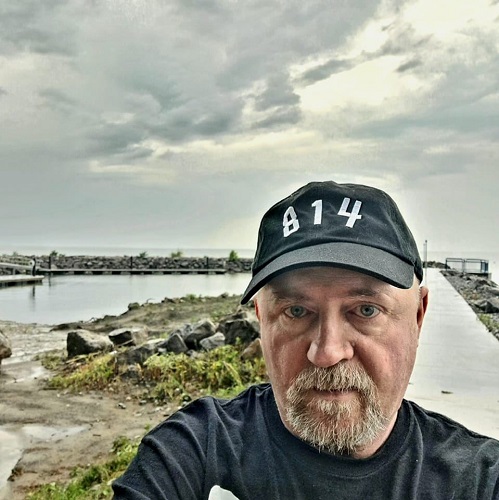Writers’ Day Jobs: Sean Thomas Dougherty
5 Minutes Read Time

Managing Editor Lisa Ampleman: In Sean Thomas Dougherty’s inventive short lyric essay in our Issue 16.1, “The Vietnamese Girls from the Nail Shop down the Plaza,” he describes the scene of a pool hall where he worked. Dougherty’s characterizations of the titular girls—”no, the women”—and their boyfriends, one of whom brings his autistic younger brother to the pool hall and also cares deeply about his grandmother in dialysis, demonstrate the kind of care for other human beings that is often absent in contemporary life, especially online. I wasn’t surprised, then, to learn from social media that Dougherty works as a caregiver in the medical field. Recently, I reached out to hear more about that and his writing life:
How would you describe what you do for your day job?
My day job is a night job. I work third-shift med tech in a residential facility for traumatic brain injuries. It is a long-term care facility, meaning some folks live there permanently. Others might transition back into independent living or family. I can’t go into too much detail due to privacy issues, but a good night might go like this. Punch in, transfer med cart, fill out paperwork, do quick room check so I know where everyone I am watching over is. Many of my people stay up late and wander; they have a certain amount of autonomy. I might play cards, listen to someone and counsel them if they are having a challenging time, resolve any small issues of living. I pass out pills and make breakfast in the morning, do more paperwork. Sometimes I have to remind someone where they live. Hopefully, no one is in trouble, but there is always a danger of a medical crisis. A bad night could involve CPR or rushing someone to the hospital. If I had to say what my job is in one sentence, it sounds dramatic but it is true: I stay up at night to make sure the people I am entrusted to watch over don’t die.
What do you enjoy about that job, and what are some of its detractions?
There is something I want to call honorific in taking care of another human being. It can also be brutal and difficult, but it is necessary work. If not us, who? Caregivers are profoundly undervalued and underpaid in our culture. Sometimes the people we take care of can be quite abusive to both themselves and staff. But the art of caring means you as staff, your “feelings” really don’t matter, you are trained with professional detachment to resolve issues, and care has nothing to do with “deserve.” We take care of people who were often self-destructive and have ended up in our facility due to accidents and medical issues but also due to years of self-abuse. You cannot judge or make judgments on the past. What has “deserve” to do with a human life? In a society based on usage and Capital, a human life is too often tied to “deserve.” Yet I should add that who I work for is a huge private health-care company. At the end of the day these people are profit-focused, providing a high degree of wealth to the top levels of the corporation. In a truly just society, profit would have nothing to do with health and care.
How, if at all, does your day job inform—or relate to—your writing life?
I am a long-time caregiver at home, for my daughter who is autistic, my children, my wife who battled long-term illness. And all of this is in my writing. I think of the poem always as a kind of bandage for the injuries a stranger might carry. We author the poem as a healing agent and send it out to the world in the hope it will find who needs it to keep living. To say to another human being, you are not alone.
[Editor’s note: Check out Dougherty’s viral poem “Why Bother” for more of that sentiment.]
What creative projects are you working on right now?
I have a book I am still editing to be published by BOA Editions in 2023. It is titled Death Prefers the Minor Keys. It is a book of prose poems/indeterminate prose about caregiving, Jewish mysticism, and more. This is a book that has risen directly out of the night shift, often while my own wife was across town in the hospital while I was working. Many of the pieces began with a few scribbles quickly written on the back of medical forms. It is a book of collage and broken narratives, and even imagined therapies! I don’t want to call it a book of poems. I’m not sure if there is a name for it.
Sean Thomas Dougherty is the author or editor of twenty books including The Dead Are Everywhere Telling Us Things, winner of the 2021 Jacar Press Full Length Poetry Prize, selected by Jessica Jacobs and Nickole Brown. His book The Second O of Sorrow (BOA Editions, 2018) received both the Paterson Poetry Prize and the Housatonic Book Award from Western Connecticut State University. More info on Sean can be found at seanthomasdoughertypoet.com.
